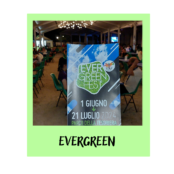TourFest2024 | A sustainable a meeting point for people and for the arts
Evergreen Fest in Torino (in English)
 For its ninth edition, Evergreen Fest imposes itself once again as a place of sustainability in every way. Created and organised by the Tedacà Company, its core objectives are to offer the “torinesi” – but not only – a place where they can meet each other among a variety of shows and events. The festival aims to be a place that favours inclusiveness and sustainability, environmental and economical ones. Also, everything is thought to be the most respectful towards the environment. From tents to forks, everything is made from organic, compostable or low impact materials. With the same amount of effort, culture is made accessible to every type of people, no matter their ethnic or social origins, no matter their gender, sexual or romantic orientation, age, abilities or disabilities… It is a great party where everyone’s invited, in respect of others. By “others” we mean not only humans, but also everything else that makes up our environment, society and, above all, the natural world.
For its ninth edition, Evergreen Fest imposes itself once again as a place of sustainability in every way. Created and organised by the Tedacà Company, its core objectives are to offer the “torinesi” – but not only – a place where they can meet each other among a variety of shows and events. The festival aims to be a place that favours inclusiveness and sustainability, environmental and economical ones. Also, everything is thought to be the most respectful towards the environment. From tents to forks, everything is made from organic, compostable or low impact materials. With the same amount of effort, culture is made accessible to every type of people, no matter their ethnic or social origins, no matter their gender, sexual or romantic orientation, age, abilities or disabilities… It is a great party where everyone’s invited, in respect of others. By “others” we mean not only humans, but also everything else that makes up our environment, society and, above all, the natural world.
A REPAIR OF THE TERRITORY
The festival gives great importance to its environmental impact, and deploys a lot of its efforts to reduce it to a minimum: every object and material has been carefully thought out to be as non-polluting as possible; the place is judiciously enlightened by LEDs, menus are printed on recycled paper, forks and knives are made from recycled and compostable plastic… The pride of this year’s edition is the achievement of the new reusable glasses, avoiding disposable ones.
Thus the organisation team from the Tedacà company works towards environmental sustainability on different scales. Firstly, from a local point of view, they wanted to reinstate this Parco della Tesoriera, abandoned by the city for years. By inhabiting this green place and adorning it with the various arts and shows on offer in the festival’s vast programme, they bring the park back to life and showcase its greenery and nature, while making a point respecting it. Then, it works on its effects on the planet, which is a great challenge today, especially for the performing arts, known for its heavy environmental footprint. As an illustration, a study led in France showed that a theatre would release between 1200 and 1500 tons of CO2 every year, not to mention the important environmental impact of noise and numeric pollution, and most of all the energy intake for the stage production (sounds, lights, etc.). Here at Evergreen Fest for instance, to lower noise pollution and keep a great bond with the neighbourhood, a great attention is attached to respect volume limits: stage is facing the lawn, with its back to the nearest houses so as to lower the sound impact on them. In the same mood to avoid noise, thrice a week there are talks, performing shows or cinema evenings. Likewise, silent nights are set up, with the use of bluetooth headphones, both silent disco nights once a week and some movie nights…
Most of all, in accordance with their ambition of being economically and environmentally sustainable, Evergreen advocates local production, from the tomato of your panino to the artist of the set. The main part of the programme is indeed made of local artists, mostly from Torino, a choice that permits to match economic and environmental sustainability, as the festival does not have to take in charge transport and accommodation for every artist they schedule. In that way, it also participates in the region dynamic and supports artistic emergence. In the restaurant part of the festival you can find amongst local products, a local beer made from bread mixed with malt brewing.This is a great alternative to the beer fabrication’s heavy environmental footprint, a fact too often forgotten or ignored…
Working so deeply in these different layers – environmentally, socially and economically, Evergreen Fest turned out to be a festival of repair on different layers: repair our relationship with the territory, but also with each other between humans.

A silent disco night at Evergreen Fest (ph. Emanuele Basile)
SERVING CULTURE ON A GREEN PLATTER
Besides the environmental attention of the Evergreen staff, everything has been made to make this place welcoming for everyone, a meeting point that stands for people as much as for the arts. Free access to the festival and all the shows and workshops is a cause close to Evergreen’s heart, and each year a bigger challenge to Carlotta Lando, member of the festival’s staff. This decision to keep events free of charge reflects the strong will to include everyone, which is quite rare in today’s highly exclusionary society. One of the event’s main objectives is to open arts to a new and unusual audience.
At Evergreen Fest, Tedacà does not want money and social hierarchy to be a barrier between people and culture. Furthermore, not only do you have free access to all the shows of the programme, but Evergreen Fest is indeed a place where you can find free workshops aimed at everyone, from child to adult, such as watercolour, drama or dance workshops.
Besides being an artistic place who offers free shows and workshops for everyone, it is a family place where you can go freely to enjoy a great moment, and discover culture and arts under a new eye.

Talk with Luca Trapanese (ph. Chloé Pottier)
TO GIVE VISIBILITY TO LEFT BEHIND CAUSES AND MINORITIES
This inclusiveness is furthered by the menu, which proposes vegetarians and vegan options, but mostly through the programme. The event stands as a real artistic crossroads, where one can find every type of arts, from drama to literature, from music to dance. Sometimes it is all at once, as it was for the performance of July the 11th, Rosso Indelebile by Artemixia, where music, song, dance, movie, drama and poesy were mixed together on stage to create an artistic statement against domestic violence. More than a multidisciplinary vision of the performing arts, Evergreen offers a place and opportunity to insert (or reinsert) people usually put aside by the society, left behind as the Parco della Tesoriera, into it.
The program also allows us to highlight and tackle themes that have been sidelined, or that help to inform us and open us up to profiles and stories other than our own or those which we are usually exposed to. For instance, on July the 9th, word was given to Valeria Carletti, suffering from spastic tetraparesis from her birth, meaning that she is partially paralysed. Through her novel presented as a diary of someone travelling around the world to assist to concerts, she gives her perspective of the world in which we are living and evolving, perspective from someone who has to adapt to a world not thought to her disease and reduced capacities. After that, she gave her place to Laura Pusceddu and Sabrina Russo for two stand-ups whose main subjects are gender and society. The following day, it was Luca Trapanese’s turn to talk about the difficult ordeal of adopting his daughter Alba, who has Down’s syndrome, as a single gay man. After an introduction from Luca Trapanese interviewed by Simone Schinocca (artistic director of Tedacà) about his book, Nata per te (Einaudi, 2018), Fabio Mollo’s film adaptation was screened. Programming so many of these artists and shows approaching these themes, it’s clear that the Evergreen Fest programme wants to put on stage new emerging artists, and minorities left behind by society.
To keep this ideal of opening culture to everyone, Evergreen can count on its sponsors as Iren, one of the main italian energy operator, proclaiming itself “leader of the transition”. The festival is also financially supported by the associations with which they collaborate, such as the Fondazione Time2, which works to make society more welcoming towards the diversity of people, “with and without disabilities”. Thus we can find amongst the festival volunteers neurodivergent people, serving and welcoming us in this area. Everything has been thought and adapted to include as much as possible people with disabilities, whatever their form of disabilities. The area is wheel-chair accessible, we can find a quiet room, a safe place for people in need of calm, pressured by the agitation and the noise of the festival. Furthermore, shows are adapted to every type of sensory impairments: one can find shows for deaf people, with LSI interprets, and every event also includes blind or partially sighted people, with auditive introduction before every one of them.
Evergreen Fest is a great illustration of the intelligent and sustainable cohabitation’s possibility between the natural environment and its human inhabitants. It shows not only that it is possible to have fun and enjoy our lifetime while respecting our environment, but that it is The Best Way: by being respectful of everything and everyone, in all its diversity. To conclude, I will borrow Giulia Vescovo’s words used to explain Evergreen’s project: Evergreen, through its ambitions and actions, is planting a myriad of seeds, cultural, artistical, and solidarity seeds in people’s minds. Who knows which flower it will grow into later? Evergreen has done its job, then it is up to us to farm this seed.
Tag: Ateatro in English (8), sostenibilità (27), Tedacà (3)








